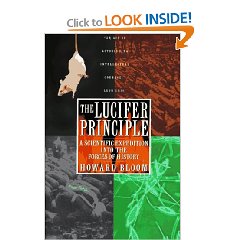
THE best combination of strategy, psychology, & intelligence about REALITY,
The author is a world-class strategist, warrior, psychologist, intelligence professional, and writer.
He returns to four familiar themes, with all new refreshing insights:
1. America has no strategy and no official means of getting there. He ends the book by pointing out that drawing lines between the US, Spain, and Portugal to African and Latin American countries with colonial ties to these countries, and then lines of modern immigration and kinship back to the US, would be a de facto strategic network worthy of consideration.
2. America has the wrong military, with too few infantry, military police, and even truck drivers. He is brutally on the mark when he concludes that the current Administration's efforts to out-source everything led to the out-sourcing of America's honor. The author is on target when he revisits his long-standing beef with the U.S. Navy, which is still trying to build to “four carriers on the Kamchatka peninsula” and the rest on China. We need a 450-ship Navy capable of executing peace from the sea, and we need an Air Force capable of two Berlin Airlifts at once, with a budget for the peace goods they will need to carry to the 30+ failed states that spawn terrorism, infectious disease, poverty, environmental degradation, civil war and genocide, and of course crime.
3. Even with the right military–that is to say, a military able to dispatch single terrorists with a single bullet, able to mount punitive “in and out” expeditionary operations, and–where called for–invade and occupy for extended periods, but with proper planning for the post-war transition to peace–military intelligence is completely broken. It cannot find the targets known to exist at the individual and tribal levels, and it cannot anticipate emerging threats. I would add that civilian intelligence is just as broken. The current Director of National Intelligence and his senior agency heads are continuing the Cold War systems that are “inside out and upside down” and have no idea how to create a modern intelligence capability that is founded on multinational and inter-agency information sharing, and on making the most of what can be known from open sources of information in all languages.
4. Faith is a strategic factor. The author is compelling when he slams not just the radical Islamic terrorists, but the ideologically insane evangelical Christians in America, for religious degradation rather than religious charity. David Johnston, author of the very influential book on “Faith-Based Diplomacy” would certainly agree. The author excels at criticism of our mis-placed faith in technology and “precision munitions” while ignoring what Army War College strategist Steve Metz calls “precision psychology.” In this vein the author points out that the fastest way to calm the Earth and increase productivity while reducing poverty is to focus on human capital and the education of the poor. Michael O'Hanlon has pointed out that the single greatest return on investment comes from a dollar spent on the education of women. This is where Google.org might usefully apply it extraordinary capabilities. Free online education in all languages, and donated Internet access centers and study computers in every village across Africa.
There are two portions of the book that are priceless gems worthy of inclusion in the welcoming kits of every War College student: the ten lessons of Iraq, and Occupation 101. Buy the book for these alone, and enjoy the rest as context.
Ralph Peters is a patriot. Occasionally he will rant, occasionally he will be belligerent and unwilling to entertain the reasonable claims and concerns of the enemy, but on balance, there is no other author that I would rather read in the domain of national security, than Ralph Peters. For complementary and sometimes opposing views, I recommend Colin Gray's “Modern Strategy,” Jonathan Schell's “Unconquerable World,” Joe Nye's “Paradox of American Power,” William Shawcross, “Deliver Us From Evil,” and C. K. Prahalad's “The Fortune at the Bottom of the Pyramid,” but see my lists for many other suggested top-notch books in the field of non-fiction about reality.








